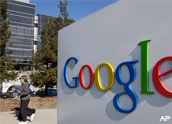
In a deal that adds credibility to Google’s controversial library project, the search giant on Wednesday said the University of California (UC) has agreed to allow the company to digitize and make searchable books from collections housed at its more than 100 libraries across its 10 campuses.
Specifically, the relationship between the Internet company and the higher educational institution will make books searchable on Google Book Search.
Readers will be able to view, browse, and read the full texts of books that are in the public domain, which include many books in the UC libraries’ historic and special collections.
For books protected by copyright, users will just get basic background — such as the book’s title and the author’s name, a few lines of text related to their search, and information about where they can buy or borrow the book.
“For readers, researchers and book lovers all over the world, this means even more access to the great works of history and culture. So a student, a teacher, a doctor or anyone in a remote corner of the world will be able find information held on library shelves thousands of miles away in California — simply by searching online,” Google said in its announcement.
Understanding Google Books
As its name suggests, the Google Books Library Project digitizes books from major libraries around the world and makes their collections searchable on Google Book Search.
The University of California becomes the latest partner in the Google Books Library Project, which also includes the University of Michigan, Harvard University, Stanford University, Oxford University and the New York Public Library. Unlike UC, though, the other universities are making available only books in the public domain.
“The academic enterprise is fundamentally about discovery. We contribute to it immeasurably by unlocking the wealth of information maintained within our libraries and exposing it to the latest that search technologies have to offer,” said John Oakley, Chair of UC’s system-wide academic senate and professor of law at UC Davis.
Google is also conducting a pilot project with the Library of Congress.
Controversial Plan
Despite the highly respected participants, Google has been the target of two lawsuits since it launched the book search project last year. The Association of American Publishers (AAP) and the Authors Guild both filed suit against the search titan, asserting that Google should seek the permission of copyright holders before digitizing books.
“[It is curious] that any institution, the University of California, or otherwise, would choose to join a project that is subject to pending litigation on the grounds, as we contend, that it violates copyright law,” Allen Adler, vice president of legal and government relations for the AAP, told TechNewsWorld.
The decision not to bring the libraries into the suit as co-defendants was a tactical one, Adler added, and should not be taken as a sign that the AAP does not view the libraries as potentially liable. The AAP’s goal was merely to streamline what is likely to be a complicated and lengthy copyright suit.
Neither Google nor UC was immediately available to comment. However, Google has maintained that its actions are legal because it only offers brief overviews of the copyrighted material. Of course, Google benefits from the library project by enriching its search engine with unique material.
Like its many other software tools and content initiatives, the library gives people one more reason to visit Google’s site, where they can be exposed to displays from Google’s advertiser network. Google generates most of its profits through paid-search advertising programs.
Vindicating the AAP
AAP’s Adler believes Google’s recent content deals with Viacom, MTV Networks and the Associated Press support the validity of the authors’ and publishers’ perspective.
“Google has vindicated our proposition that the value of the search engine is directly related to whether or not there is content that has a market for searching. In the instance where Google does believe that such a market exists, they seem to be willing to negotiate license agreements,” Adler concluded.




















































